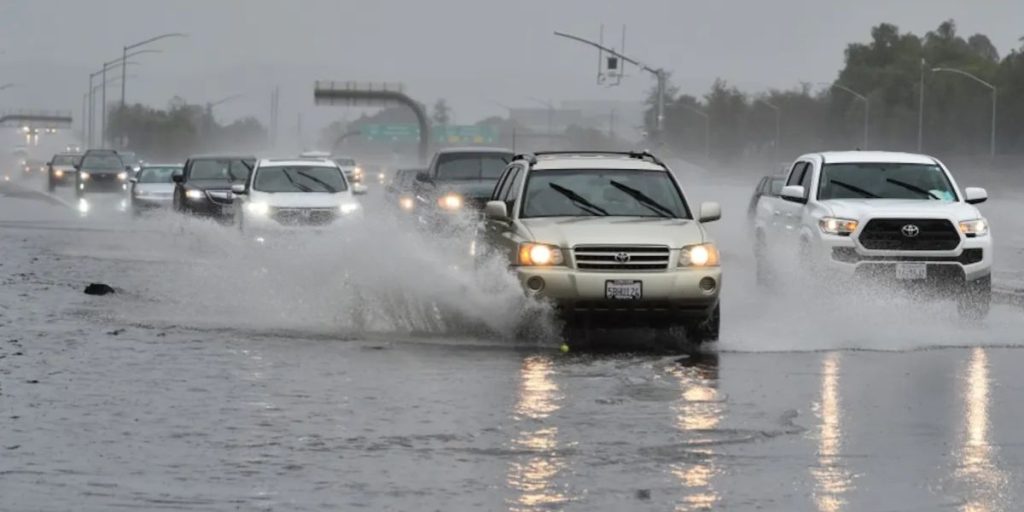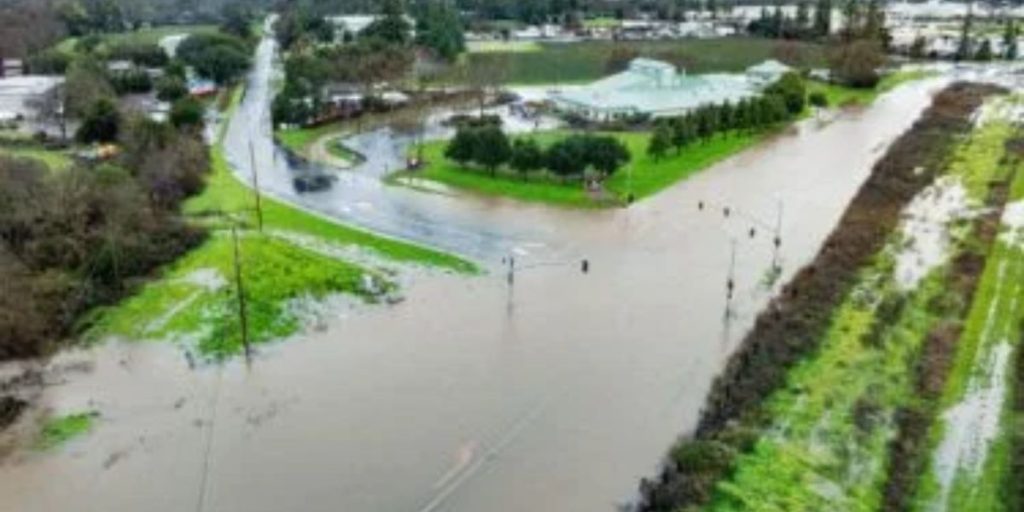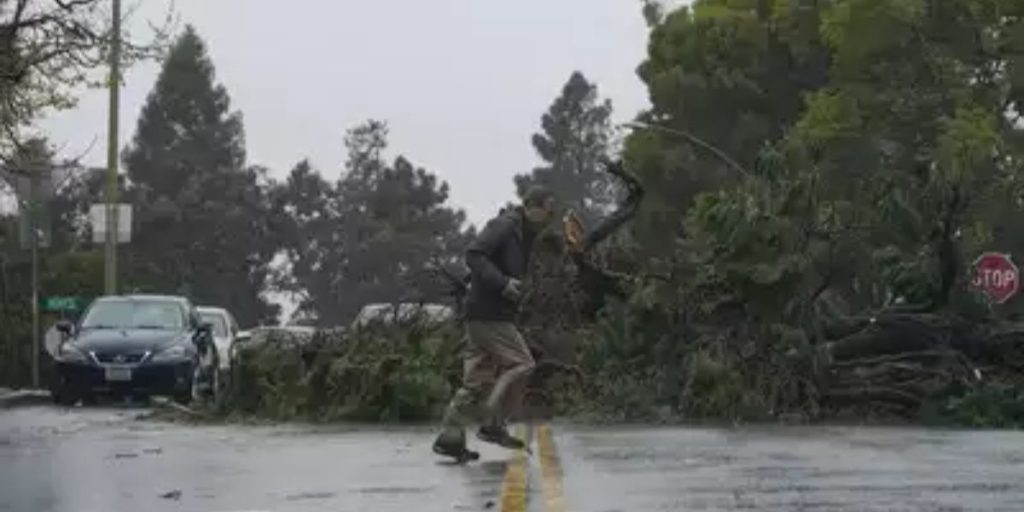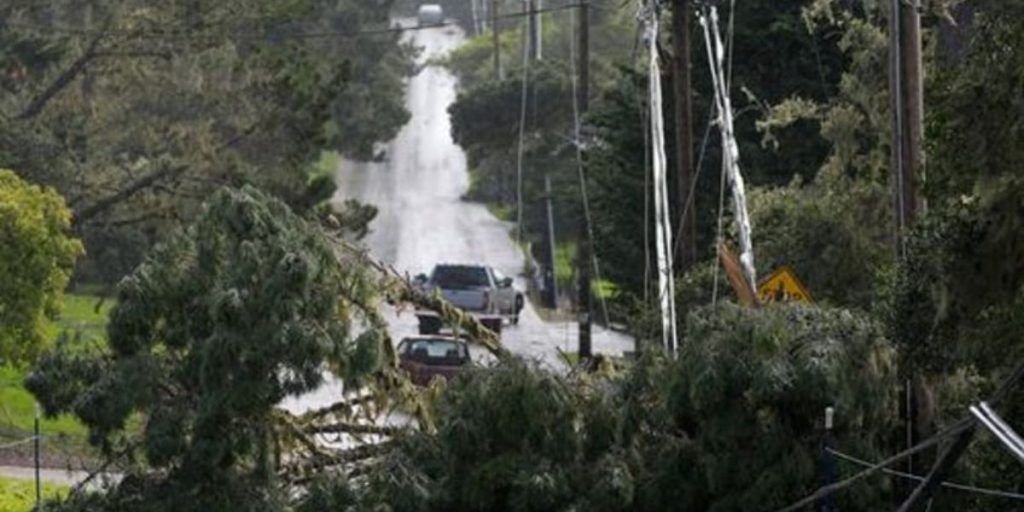A strong, long-lasting atmospheric river is sweeping into California on Sunday, bringing the risk of “life-threatening” flooding, mudslides, and extensive power outages as heavy rain and snowfall. This is what is happening:
- A rare Level 4 of 4 risk of extreme rainfall was expanded Sunday to cover Los Angeles, Santa Barbara, and Oxnard in Southern California, with the weather prediction center warning of “life-threatening flash and urban flash flooding.” Rainfall rates of up to one inch per hour will result in 3 to 6 inches of rain across the area. Much of coastal California, including San Francisco, is at a higher Level 3 risk.
- A month’s worth of rain possible in Los Angeles: In Central and Southern California, widespread rainfall totals of 3 to 6 inches are forecast, which is more than a month’s worth for the majority. There are signs that the storm might be as powerful as Tropical Storm Hilary from last August, Los Angeles Mayor Karen Bass warned during a news conference Friday, urging residents to take “common sense precautions.”
- Mandatory evacuation orders have been issued for towns in Santa Barbara, San Jose, Los Angeles, and Ventura counties. Officials warned people that the atmospheric phenomenon might cause “life-threatening” floods and landslides. Several Santa Barbara County school districts have also canceled classes for Monday due to the inclement weather.

- First hurricane-force wind warning: On Sunday, the National Weather Service in San Francisco issued the first hurricane-force wind warning in recorded history. Winds between 40 to 60 mph are forecast across the state, with gusts up to 95 mph in the foothills and mountains. Wind advisories and high wind warnings are in force for over 30 million people in inland areas spanning the whole state, from Redding to San Diego.
- “Nearly impossible” travel in the mountains: The storm is also predicted to produce substantial snowfall totals to eastern California and the Nevada border. The meteorological service predicts that heavy wet snow will spread across the Sierra Nevada through Monday, with accumulation rates ranging from 2 to 3 inches per hour. Wind gusts are anticipated to cause whiteout conditions, making travel above 5000-6000 feet “near impossible,” according to the weather agency.
- Power outages on the rise: According to the tracking website PowerOutage.us, more than 800,000 customers in California are without power, with outages increasing rapidly, particularly near the coast, as rain and strong winds come in. Blackouts are predicted to rise, particularly in central and southern California, as wind gusts intensify throughout the evening and into tomorrow.
- Rain and wind create flight delays: FlightAware reports that at least 143 flights into and 122 flights out of San Francisco International Airport have been delayed. At least 100 planes were canceled on Sunday.
- Sporting events impacted: Due to adverse weather, both NASCAR and the PGA canceled events scheduled in California this weekend. NASCAR rescheduled the Busch Light Clash at the Los Angeles Memorial Coliseum for Saturday night, while the PGA Tour announced that the final round of the Pebble Beach Pro-Am golf tournament will be postponed to Monday.

The state prepares for flooded roads and swelling waterways.
This atmospheric river, a long, narrow moisture zone that carries saturated air hundreds of miles before discharging it like a fire hose, follows another storm that dumped record amounts of rain throughout most of California, including Los Angeles.
However, this storm is slower and is predicted to stall as it comes onshore, resulting in far longer periods of rain than the previous.
According to the forecast agency, the storm will be most severe between Sunday and Tuesday.
The most significant amounts of rain and flooding are forecast along the state’s central and southern coastlines. This encompasses the Los Angeles and San Diego metropolitan areas.
Combined with the 2.49 inches that poured in Los Angeles on Thursday, the city might receive nearly a year’s worth of rain in just the first week of February.

“This damaging flooding will be a threat to lives and property,” warned Eric Schoening of the National Weather Service during a news briefing Saturday. “Please, if you come across a flooded roadway, we urge you to turn around, don’t drown.”
Many roads might flood, and creeks, streams, and rivers could rise significantly, causing mudslides, rock slides, and debris flows, according to Schoening.
On Sunday, the National Weather Service in San Francisco reported a landslide in the city. Sgt. Ethan Ragsdale of the Santa Barbara Police Department told CNN that the storm caused “extremely high winds,” flooding, and toppled trees in Santa Barbara, which is over 300 miles south.
The prediction center warned that parts of the Transverse Ranges in Southern California could receive at least 8 inches of rain in less than 24 hours, with over 10 inches probable in certain regions.
California Governor Gavin Newsom went to the state’s operations center in Mather on Sunday to get an update on the latest weather forecasts and the state’s response activities.
Newsom’s office announced Friday that the state has 1,200 pieces of winter equipment available to clear snow and ice from roadways, 21 swift water rescue teams on standby, and California National Guard personnel ready to deploy quickly. More than 7 million sandbags have been prepositioned, and the state is ready to offer shelter and food to over 37,000 individuals.
Tony Tavares, head of the California Department of Transportation, told CNN Newsroom on Sunday that his department is “coordinating across multiple state departments, regional and local agencies to ensure the safety of all Californians.” This includes deploying approximately 4,000 personnel and storm equipment, such as portable pumps and generators, throughout the state,” Tavares said.

Tavares described the department’s operations as “all hands on deck,” with some teams in Northern California monitoring wildfire burn scar areas, some dealing with snow and ice in the mountains, and others on the southern coast keeping an eye out for significant flooding.
Nancy Ward, director of the California Governor’s Office of Emergency Services, stated that over 8,500 personnel, including swift water and helicopter rescue teams, have been deployed statewide to respond to any potential calls for help.
“These next storms are going to be impactful and dangerous,” Ward said at a press conference Saturday. “They’re the most dangerous natural disasters that we have, killing more people from storm damages and flooding than wildfires every year.”
The impact of heavy onshore winds will be felt across northern and central California through Sunday, eventually migrating to southern California by Sunday night, according to the National Weather Service.
Wind advisories and strong wind warnings cover almost the whole state of California, from Redding to San Diego, and affect almost 30 million people.